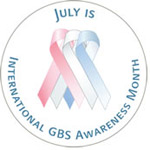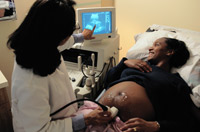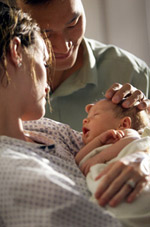Protect Your Baby from Group B Strep!
 Protect your baby from group B strep. If you're 35-37 weeks pregnant, ask your doctor or nurse about a group B strep test.
Protect your baby from group B strep. If you're 35-37 weeks pregnant, ask your doctor or nurse about a group B strep test.
 If you are pregnant—or know anyone who is—you need to know about group B strep (GBS), also known as baby strep. This disease is caused by group B streptococcal bacteria, which are commonly found in healthy women of all races and ethnicities. In fact, about 1 in 4 women in the U.S. carry these bacteria, which they can pass on to their baby during childbirth. If you have GBS, your baby can get very sick and even die if you are not tested and treated.
If you are pregnant—or know anyone who is—you need to know about group B strep (GBS), also known as baby strep. This disease is caused by group B streptococcal bacteria, which are commonly found in healthy women of all races and ethnicities. In fact, about 1 in 4 women in the U.S. carry these bacteria, which they can pass on to their baby during childbirth. If you have GBS, your baby can get very sick and even die if you are not tested and treated.
Being a carrier for GBS bacteria does not mean you have an infection. It only means you have these bacteria in your body. You would not feel these bacteria or have symptoms like a yeast infection. These bacteria are usually not harmful to you—only to your baby during childbirth or soon after being born.
Preventing Group B Strep
Ask your doctor or nurse for a GBS test when you are 35–37 weeks pregnant. The test is an easy swab of the vagina and rectum that should not hurt.
Each time you are pregnant, you need to be tested for GBS. It doesn't matter if you did or did not have this type of bacteria before; each pregnancy is different.
Carrying GBS bacteria does not mean that you are not clean, and it does not mean that you have a sexually transmitted disease. The bacteria are not spread from food, sex, water, or anything that you might have come into contact with. They can come and go naturally in the body.
 The medicine to stop GBS from spreading to your baby is an antibiotic given during labor. The antibiotic (usually penicillin) is given to you through an IV (in the vein) during childbirth. If you are allergic to penicillin, there are other ways to help treat you during labor.
The medicine to stop GBS from spreading to your baby is an antibiotic given during labor. The antibiotic (usually penicillin) is given to you through an IV (in the vein) during childbirth. If you are allergic to penicillin, there are other ways to help treat you during labor.
Antibiotics taken before labor will not protect your baby against GBS. The bacteria can grow back so fast that taking the medicine before you begin labor does not prevent the bacteria from spreading to your baby during childbirth.
Other people in the house, including kids, are not at risk of getting sick from GBS.
If you think you might have a C-section or go into labor early (prematurely), talk with your doctor or nurse about your personal GBS plan.
What You Can Do Before Labor
 Ask your doctor or nurse for a GBS test when you are 35–37 weeks pregnant.
Ask your doctor or nurse for a GBS test when you are 35–37 weeks pregnant.- If you are allergic to penicillin or other antibiotics, make sure to tell your doctor or nurse about any reactions you have had.
- If your test shows that you carry the bacteria, talk with your doctor or nurse about a plan for labor.
- Continue your regular check-ups, and always call your doctor or nurse if you have any problems.
When Your Water Breaks or When You Go into Labor
If you have not had your GBS test when labor starts, remind the staff that you do not know your GBS status.
If you are a GBS carrier:
- Go to the hospital. The antibiotics work best if you get them at least 4 hours before you deliver.
- Tell the labor and delivery staff at the hospital that you are a group B strep carrier.
- Speak up if you are allergic to penicillin.
- Expect to get IV antibiotics (medicine through the vein) during labor.
And remember, breastfeeding is one of the best things you can do for your baby, even if you have tested positive for GBS.
More Information
- Get a free brochure on GBS
- Call 1-800-CDC-INFO
- Send an email request to CDC INFO
- Print from a PDF available online
- Download or listen to a podcast
- Send a Health-e-Card
- Prevent Infection and Keep Your Unborn Baby Safe
- ABCs of Healthy Pregnancy
- Preventing Group B Strep
Information for patients, hospital and healthcare providers, laboratory personnel, and state and local health departments
CDC works 24/7 saving lives and protecting people from health threats to have a more secure nation. A US federal agency, CDC helps make the healthy choice the easy choice by putting science and prevention into action. CDC works to help people live longer, healthier and more productive lives.
Get email updates
To receive email updates about this page, enter your email address:
Contact Us:
- Centers for Disease Control and Prevention
1600 Clifton Rd
Atlanta, GA 30333 - 800-CDC-INFO
(800-232-4636)
TTY: (888) 232-6348 - cdcinfo@cdc.gov



